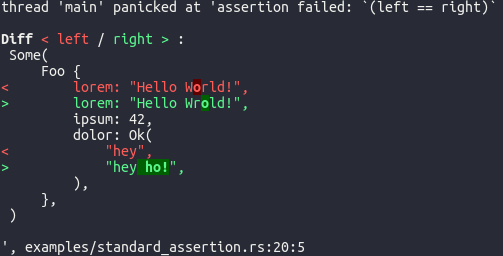


When writing tests in Rust, you'll probably use assert_eq!(a, b) a lot.
If such a test fails, it will present all the details of a and b.
But you have to spot the differences yourself, which is not always straightforward,
like here:

Wouldn't that task be much easier with a colorful diff?

Yep — and you only need one line of code to make it happen:
rust,ignore
use pretty_assertions::{assert_eq, assert_ne};
Show the example behind the screenshots above.
``rust,ignore
// 1. add theprettyassertionsdependency toCargo.toml`.
// 2. insert this line at the top of each module, as needed
use prettyassertions::{asserteq, assertne};
fn main() {
#[derive(Debug, PartialEq)]
struct Foo {
lorem: &'static str,
ipsum: u32,
dolor: Result
let x = Some(Foo { lorem: "Hello World!", ipsum: 42, dolor: Ok("hey".to_string())});
let y = Some(Foo { lorem: "Hello Wrold!", ipsum: 42, dolor: Ok("hey ho!".to_string())});
assert_eq!(x, y);
} ```
Specify it as [dev-dependencies]
and it will only be used for compiling tests, examples, and benchmarks.
This way the compile time of cargo build won't be affected!
Also add #[cfg(test)] to your use statements, like this:
```rust,ignore
use prettyassertions::{asserteq, assert_ne}; ```
Rust 2018 edition, you need to declare
use pretty_assertions::{assert_eq, assert_ne}; per module.
Before you would write #[macro_use] extern crate pretty_assertions;.assert_ne is also switched to multi-line presentation, but does not show
a diff.Licensed under either of
at your option.
Unless you explicitly state otherwise, any contribution intentionally submitted for inclusion in the work by you, as defined in the Apache-2.0 license, shall be dual licensed as above, without any additional terms or conditions.